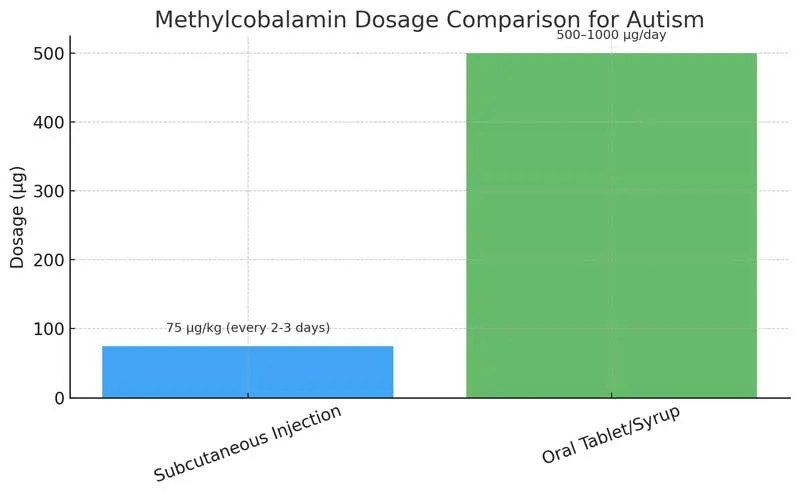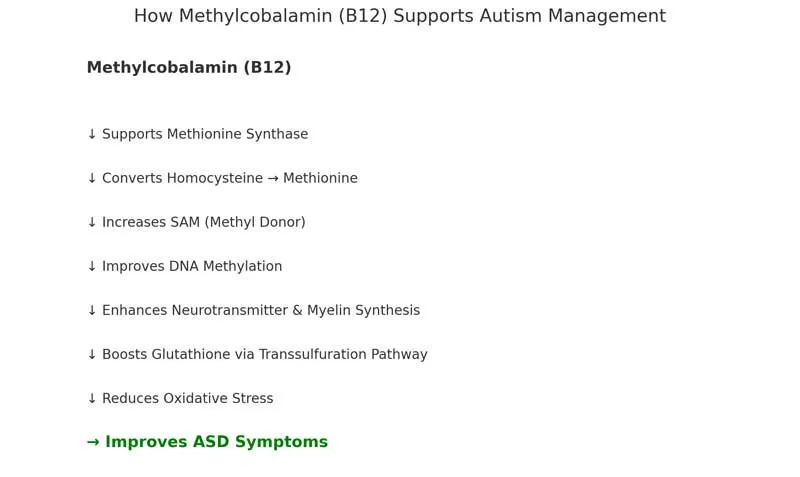Your basket is currently empty!
Methylcobalamin (Vitamin B12) for Autism: Benefits, Research, and Safety
Discover how Methylcobalamin (Vitamin B12) can support individuals with autism. Learn about its benefits, dosage, research, and safety. Find out if it’s right for your child.
Unlocking the Potential of Methyl-B12 in Autism Treatment
Discover how Methylcobalamin (Vitamin B12) can support individuals with autism. Learn about its benefits, dosage, research, and safety. Find out if it’s right for your child.
Introduction
Methylcobalamin (Methyl-B12), the active form of Vitamin B12, has gained significant attention as a potential therapy for Autism Spectrum Disorder (ASD). Due to its role in methylation, detoxification, and brain function, researchers are investigating its ability to improve behavior, communication, and metabolic processes in individuals with autism.
But what does the science say? Let’s explore the latest research, dosage guidelines, safety considerations, and expert opinions on Methylcobalamin for autism.
The Science Behind Methylcobalamin and Autism
Clinical Studies on Methylcobalamin for Autism
Numerous studies have examined the effects of Methylcobalamin supplementation in autistic individuals, showing promising yet variable results:
- Hendren et al. (2016): A randomized controlled trial (RCT) with 57 children found that methylcobalamin injections (75 µg/kg every 3 days for 8 weeks) significantly improved adaptive behaviors, attention, and social engagement in some participants.
- Frye et al. (2021): A systematic review of 17 studies concluded that subcutaneous Methyl-B12 injections improved verbal communication, daily living skills, and social interaction in children with autism.
- Corejova et al. (2022): A 6-month open-label study showed that oral Methylcobalamin (500 µg daily) led to gradual improvements in cognitive and social engagement.

“Graphic above showing the approximate behavioral response rate to methylcobalamin in autism spectrum disorder based on clinical studies. About 30% of participants were considered responders, showing notable improvements in behavior and functioning.”
How Does Methylcobalamin Work?
Methylcobalamin plays a crucial role in methylation and antioxidant pathways, which are often dysregulated in autism. Here’s how it helps:
✅ Methylation Support: Converts homocysteine to methionine, producing S-adenosylmethionine (SAMe)—a vital methyl donor for DNA repair, gene expression, and neurotransmitter balance.
✅ Glutathione Production: Boosts glutathione, the body’s master antioxidant, helping to reduce oxidative stress, a common issue in autism.
✅ Neurological Benefits: Aids in myelin formation, supporting nerve function, cognition, and mood stabilization.
Recommended Dosage of Methylcobalamin for Autism
Common Dosage Guidelines
The optimal dosage depends on individual biochemical needs, metabolism, and severity of ASD symptoms.
💉 Subcutaneous Injections: 64.5–75 µg/kg every 2–3 days (e.g., a 20 kg child would receive 1.2–1.5 mg per injection). This ensures maximum absorption (Frye et al., 2013).
💊 Oral/Sublingual Tablets: 500–1000 µg daily. This requires higher doses due to lower absorption rates (James et al., 2004).
⚡ Combination Therapy: Some experts recommend pairing Methyl-B12 with Folinic Acid (400–800 µg twice daily) to enhance methylation benefits.
📌 Consult a healthcare provider before starting supplementation.

Safety and Side Effects of Methylcobalamin
Methylcobalamin is water-soluble, meaning excess amounts are excreted in urine, making it extremely safe. However, some mild side effects have been reported:
Potential Side Effects:
- Hyperactivity or restlessness (10–12% of cases)
- Sleep disturbances (6–8% of cases)
- Irritability or mood swings (3–4% of cases)
- Injection site pain (rare, only with subcutaneous administration)
Long-Term Safety:
🔹 No significant toxicity has been found, even with prolonged use (Adams et al., 2011).
🔹 Individuals with MTHFR gene mutations may benefit the most from long-term supplementation.
Expert Opinions on Methylcobalamin for Autism
What Experts Say
🔹 Dr. Richard Frye (Pediatric Neurologist): Methyl-B12 “significantly improves metabolic function and clinical symptoms” in children with ASD.
🔹 Autism Speaks: Recognizes Methyl-B12 as a potential therapy but recommends further placebo-controlled studies (Autism Speaks, 2016).
🔹 The Autism Community in Action (TACA): Lists Methyl-B12 injections as a widely used biomedical intervention for autism management.
Should You Try Methylcobalamin for Autism?
Methylcobalamin is not a cure but may help with behavior, focus, and metabolic function. Parents considering Methyl-B12 therapy should:
✅ Consult a qualified healthcare provider
✅ Consider biochemical testing (e.g., homocysteine and glutathione levels)
✅ Start with low doses and monitor effects

Conclusion
Methylcobalamin shows promising potential as a supportive therapy for autism, especially in individuals with methylation impairments and oxidative stress issues. Research highlights adaptive behavior, social skills, and cognitive function improvements, particularly with subcutaneous injections.
📢 For the latest research on autism therapies, visit Ampavit.com.
Read the full research PDF with reputable links for the above article “Click Read button below”


Leave a Reply
You must be logged in to post a comment.